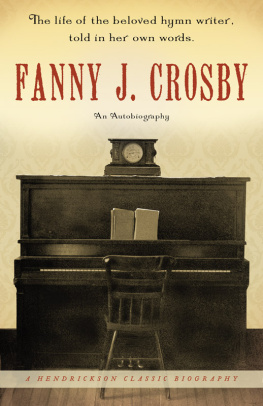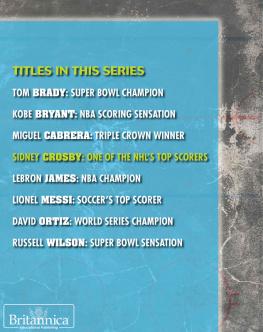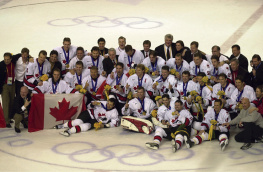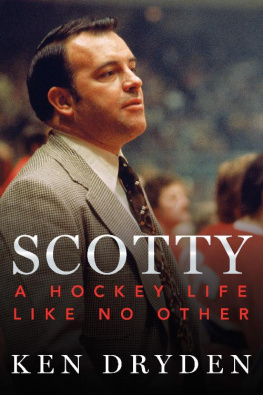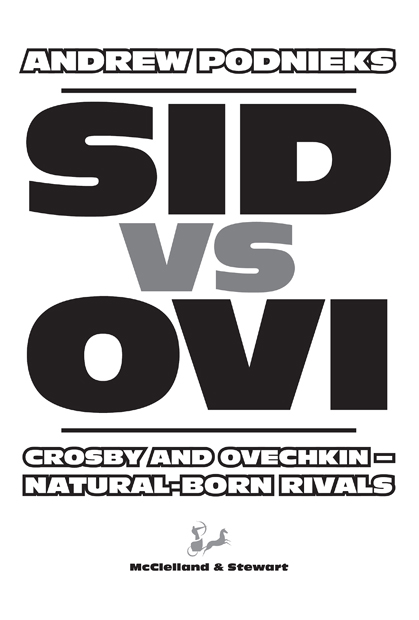Andrew Podnieks is the author of more than sixty books on hockey.
The following is a select list:
Hockey Superstitions
Honoured Canadiens
Players: The Ultimate AZ Guide of Everyone Who Has Ever Played in the NHL
The Complete Hockey Dictionary
World of Hockey: Celebrating a Century of the IIHF
A Day in the Life of the Maple Leafs
Canadas Olympic Hockey History, 19202010
A Canadian Saturday Night
Portraits of the Game: Classic Photographs from the Turofsky Collection at the Hockey Hall of Fame
Copyright 2011 by Andrew Podnieks
All rights reserved. The use of any part of this publication reproduced, transmitted in any form or by any means, electronic, mechanical, photocopying, recording, or otherwise, or stored in a retrieval system, without the prior written consent of the publisher or, in case of photocopying or other reprographic copying, a licence from the Canadian Copyright Licensing Agency is an infringement of the copyright law.
Library and Archives Canada Cataloguing in Publication
Podnieks, Andrew
Sid vs. Ovi : Crosby and Ovechkin, natural-born rivals / Andrew Podnieks.
eISBN: 978-0-7710-7118-8
1. Crosby, Sidney, 1987. 2. Ovechkin, Alexander, 1985. 3. Hockey players Biography. 4. National Hockey League Biography. I. Title.
GV848.5.A1P643 2011 796.9620922 C2011-902198-6
We acknowledge the financial support of the Government of Canada through the Book Publishing Industry Development Program and that of the Government of Ontario through the Ontario Media Development Corporations Ontario Book Initiative. We further acknowledge the support of the Canada Council for the Arts and the Ontario Arts Council for our publishing program.
Published simultaneously in the United States of America by McClelland & Stewart Ltd., P.O. Box 1030, Plattsburgh, New York 12901
Library of Congress Control Number: 2011925614
Cover art: NHLI via Getty Images
McClelland & Stewart Ltd.
75 Sherbourne Street
Toronto, Ontario
M5A 2P9
www.mcclelland.com
Cover art NHLI / Getty
v3.1
CONTENTS
Crosby Controls the Hardware/June 14, 2007: 2007 NHL Awards
Ovi Wins Hardware, Crosby Gains Motivation/June 23, 2010: 2010 NHL Awards
PITTSBURGH AND WASHINGTON:
A HOCKEY PRIMER
L ike a boxer who is repeatedly knocked to the canvas only to get up in the final round and win the fight, the Pittsburgh Penguins are the most survival-tested organization in sports. The team was one of six granted a spot in the NHL in 1967 as part of the doubling of the league from six teams to twelve. Other new franchises included state rivals Philadelphia, St. Louis, Oakland, Los Angeles, and Minnesota.
Yet, in each of the three distinct periods of the Penguins, the team faced the very real threat of relocation, such was the sorry state of its on-ice performance and off-ice finances. The first chapter in the teams history started in 1967 and continued to 1983. The Penguins missed the playoffs in eight of those seventeen seasons and did little damage in the years they did qualify. The lowest point came in 1975, when the Penguins, ahead in the quarter-finals against the Islanders, having won the first three games of the best-of-seven, lost the next four and were eliminated, the first time a team had blown a 30 lead since 1942.
At the same time, the team declared bankruptcy, when creditors lined up demanding to be repaid on their investment. It seemed almost certain that the Pens would move to Denver. However, another group of investors stepped in and saved the day, keeping the Pens in Pittsburgh.
The next low point came in 198384 when the Penguins had a record of 16586, their 38 points putting them dead last in the league. They were averaging fewer than seven thousand fans a game and again were in financial difficulty, but finishing last, which they later admitted they did intentionally, entitled them to the first overall draft choice in June 1984. They selected Mario Lemieux, but even this simple announcement turned into an embarrassing moment.
The whole hockey world knew well in advance that Lemieux was in a class by himself, but in the days leading up to the draft his agent and the teams general manager, Eddie Johnston, couldnt agree on a contract. So, when Lemieuxs name was called on draft day at the Montreal Forum, Mario remained in his seat, neither shaking the GMs hand nor coming to the stage for the traditional donning of the team sweater.
Soon enough, though, Lemieux signed with the Penguins, changing the course of the franchise though not right away. As the team was slowly constructed around their star player, it missed the playoffs for the next five of six seasons.
Lemieux developed into the games greatest player not named Gretzky, and the Penguins went on to win the Stanley Cup in 1991 and 92. But by 1997, Lemieux was fed up with the leagues refusal to crack down on defensive tactics such as hooking, holding, and interference, and he retired. Much of his salary had been in the form of deferred payments, and soon after he hung up his skates, the team went into bankruptcy again, Lemieuxs millions seemingly lost. He decided to buy the team using this money as equity, both saving the team, again, and recouping his money (sort of).
In order to maximize his investment, as it were, he returned to the ice and played successfully for several more years. All along, he had one interest off-ice to build a new arena. Nicknamed The Igloo, the Civic Auditorium and Mellon Arena was old and without luxury boxes, had few revenue streams beyond ticket sales, and would be the ruin of the team if it wasnt replaced. Years of frustration forced Lemieux to put the team up for sale early in the 200506 season, this despite the fact the team had just won the right to draft Sidney Crosby. Research In Motions co-CEO, billionaire Jim Balsillie, bought the team, but as soon as Balsillie made it clear his intention was to move the Penguins, NHL commissioner Gary Bettman stepped in and disallowed the sale.
Eventually, Lemieux got the City of Pittsburgh on board for a new facility. He retired because of heart palpitations in early 2006, and Crosby became the focus of the franchise, taking the team to a Cup win in 2009. The Consol Energy Center opened soon after, and the Penguins are now a thriving franchise in a league awash with financially unstable teams.
Although the Washington Capitals have never had the financial troubles of the Penguins, they, too, have had a history clearly divided. Washington was granted a team in 1974, along with Kansas City (the ill-fated Scouts), which promptly went out and had the worst season in the history of sports, the Caps winning only eight of eighty games in the first year, scoring just 181 goals and surrendering 446. They won only one of forty road games, losing a record thirty-seven in a row. They missed the playoffs each of their first eight years in the league, but in 1982 the team turned a corner when incoming GM David Poile engineered a blockbuster deal with Montreal that got them Rod Langway, Doug Jarvis, Brian Engblom, and Craig Laughlin.
The Caps then made the playoffs for fourteen straight years but never went far until 1998, when they made their first and only trip to the Stanley Cup finals. They were swept in four games by the vastly superior Detroit Red Wings, and a year later Ted Leonsis took control of the team. A more aggressive owner, Leonsis made a huge splash in 2001 when he lured Jaromir Jagr away from the Penguins, signing the scoring champion and MVP to a seven-year contract worth $77 million, the largest in league history.



